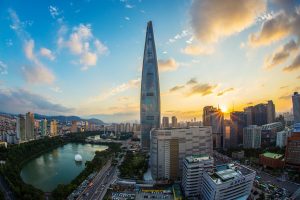The rapid spread of COVID-19 across the globe has left worsening inequality in its wake. The gap between the “haves” and the “have nots,” which was widening before the pandemic, has further been exacerbated and threatens to slow prospects for economic growth in the post-pandemic world. Seeing this already start to play out in his own country, progressive South Korean President Moon Jae-in is attempting to promote a more equitable recovery but is facing headwinds from business groups and the political opposition.
South Korea was struggling with economic inequality before 2020, though the issue has clearly gotten worse as large swaths of the economy have been seriously affected by the coronavirus. A growing sense of frustration with the disparity – imbued in popular culture by films such as “Parasite” and the widespread use of “Hell Joseon” among young South Koreans to refer to their home country – played a crucial role in Moon’s 2017 election. Since then, Moon has pursued an “income-led growth agenda,” which included raising the minimum wage, shortening the workweek, and creating thousands of new jobs. That helped to lower the degree of wage disparity since he took office. However, much of this progress is now threatened by the pandemic.
The economic woes of last year hit the lowest income group in South Korea the hardest. South Korea lost 218,000 jobs, the most since the 1997-1998 Asian Financial Crisis, with temporary workers and women experiencing the steepest fall. One survey found that nearly 37 percent of non-regular workers lost their job, double that of regular workers. Small and medium enterprises (SMEs), which employ over 80 percent of the labor force have also been disproportionately struggling to make ends meet amid stronger social distancing measures despite four rounds of government stimulus and efforts for landlords to voluntarily reduce rent.
While these challenges are not unique to South Korea, the country stands out for the relatively limited overall economic impact of COVID-19, mostly due to the successes of large conglomerates known as the chaebol. South Korea’s GDP shrank just 1 percent last year, constituting the best economic performance among OECD countries. This is thanks in part to the government’s ability to contain the outbreak while still keeping the economy running, but also because of the export successes of large companies, particularly in high-tech fields. Samsung Electronics, for instance, disclosed that its operating profit increased by 30 percent last year due to high sustained demand for semiconductors.
The success of the economy has long been tied to these large companies, but this relationship is not without its downsides. According to one 2019 report, the top 64 chaebol account for 84 percent of South Korean GDP but only represent 10 percent of jobs. With such a concentration of wealth already, the prospect of this accelerating is prompting government intervention.
Although the plans are being worked out, the Moon administration’s approach to tackling the inequality problem appears to be developing quickly along two tracks. The first was proposed by Democratic Party Leader Lee Nak-yon on January 11 as “profit-sharing,” which would work to incentivize large companies that have been finding success during the pandemic to voluntarily give to less fortunate SMEs and the self-employed. Measures under consideration include a series of tax breaks to spur giving and a special social fund. Earlier this week Moon additionally stressed the need for an institutionalized government response, entailing direct government spending. One ambitious plan from a Democratic Party member in the National Assembly calls for compensating businesses that have been forced to close with 70 percent of lost sales and those whose activities have been restricted with 60 percent. However, it is not clear what exactly the final rollout will look like, especially amid boisterous opposition.
Conservatives and industry representatives have been highly critical of redistributing profits, even though a specific plan has not yet been decided on. Some business groups are concerned that their contributions will be voluntary in name only amid heightened government pressure and some cite fears of the scheme being a means for double taxation. Domestic IT companies are particularly concerned about being asked to give more when they are already facing stiff competition from international competitors who will not be asked to make the same sacrifices. Some conservatives are also denouncing the idea as bad for business at a crucial time for growth.
Despite this pushback, the government is getting support from abroad for its new inclusive growth priorities. During their annual meetings with officials from South Korea’s finance ministry this week, IMF officials backed selectively providing assistance to people and sectors hit hardest from the pandemic. South Korea was also touted as a model for other countries to follow in this regard by the executive director of Oxfam International, a major international development NGO.
More details about the government’s final plans are expected next month, though the opposition is unlikely to fade regardless of the outcome. Still, there is a clear imperative to do more about rising inequality. The success of whatever is implemented will ultimately require the Moon administration’s continued engagement with business leaders to find the right balance between unfettered and sustainable, inclusive growth.

































